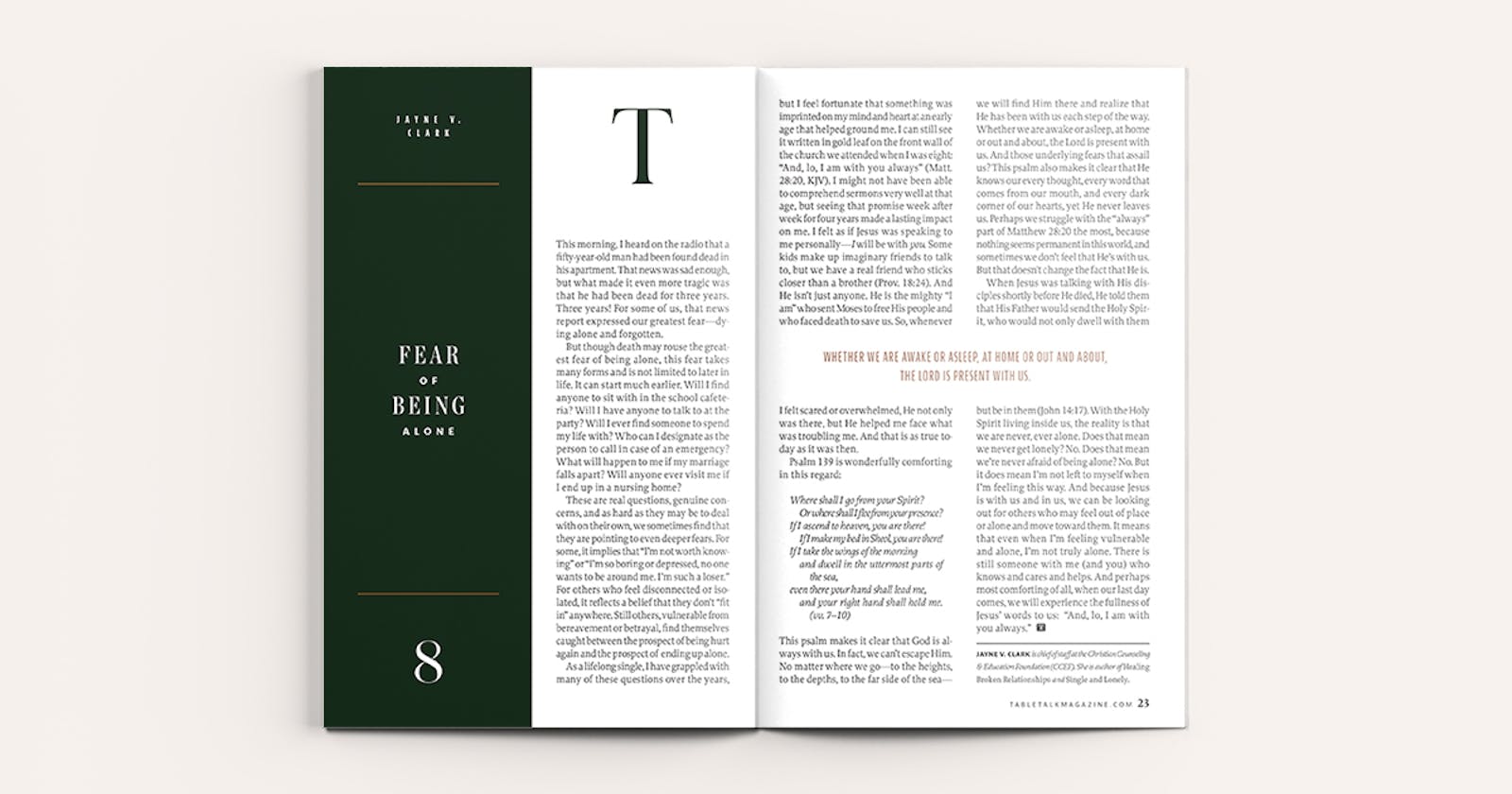
Request your free, three-month trial to Tabletalk magazine. You’ll receive the print issue monthly and gain immediate digital access to decades of archives. This trial is risk-free. No credit card required.
Try Tabletalk NowAlready receive Tabletalk magazine every month?
Verify your email address to gain unlimited access.
This morning, I heard on the radio that a fifty-year-old man had been found dead in his apartment. That news was sad enough, but what made it even more tragic was that he had been dead for three years. Three years! For some of us, that news report expressed our greatest fear—dying alone and forgotten.
But though death may rouse the greatest fear of being alone, this fear takes many forms and is not limited to later in life. It can start much earlier. Will I find anyone to sit with in the school cafeteria? Will I have anyone to talk to at the party? Will I ever find someone to spend my life with? Who can I designate as the person to call in case of an emergency? What will happen to me if my marriage falls apart? Will anyone ever visit me if I end up in a nursing home?
These are real questions, genuine concerns, and as hard as they may be to deal with on their own, we sometimes find that they are pointing to even deeper fears. For some, it implies that “I’m not worth knowing” or “I’m so boring or depressed, no one wants to be around me. I’m such a loser.” For others who feel disconnected or isolated, it reflects a belief that they don’t “fit in” anywhere. Still others, vulnerable from bereavement or betrayal, find themselves caught between the prospect of being hurt again and the prospect of ending up alone.
As a lifelong single, I have grappled with many of these questions over the years, but I feel fortunate that something was imprinted on my mind and heart at an early age that helped ground me. I can still see it written in gold leaf on the front wall of the church we attended when I was eight: “And, lo, I am with you always” (Matt. 28:20, KJV). I might not have been able to comprehend sermons very well at that age, but seeing that promise week after week for four years made a lasting impact on me. I felt as if Jesus was speaking to me personally—I will be with you. Some kids make up imaginary friends to talk to, but we have a real friend who sticks closer than a brother (Prov. 18:24). And He isn’t just anyone. He is the mighty “I am” who sent Moses to free His people and who faced death to save us. So, whenever I felt scared or overwhelmed, He not only was there, but He helped me face what was troubling me. And that is as true today as it was then.

Psalm 139 is wonderfully comforting in this regard:
Where shall I go from your Spirit?
Or where shall I flee from your presence?
If I ascend to heaven, you are there!
If I make my bed in Sheol, you are there!
If I take the wings of the morning
and dwell in the uttermost parts of the sea,
even there your hand shall lead me,
and your right hand shall hold me. (vv. 7–10)
This psalm makes it clear that God is always with us. In fact, we can’t escape Him. No matter where we go—to the heights, to the depths, to the far side of the sea—we will find Him there and realize that He has been with us each step of the way. Whether we are awake or asleep, at home or out and about, the Lord is present with us. And those underlying fears that assail us? This psalm also makes it clear that He knows our every thought, every word that comes from our mouth, and every dark corner of our hearts, yet He never leaves us. Perhaps we struggle with the “always” part of Matthew 28:20 the most, because nothing seems permanent in this world, and sometimes we don’t feel that He’s with us. But that doesn’t change the fact that He is.
When Jesus was talking with His disciples shortly before He died, He told them that His Father would send the Holy Spirit, who would not only dwell with them but be in them (John 14:17). With the Holy Spirit living inside us, the reality is that we are never, ever alone. Does that mean we never get lonely? No. Does that mean we’re never afraid of being alone? No. But it does mean I’m not left to myself when I’m feeling this way. And because Jesus is with us and in us, we can be looking out for others who may feel out of place or alone and move toward them. It means that even when I’m feeling vulnerable and alone, I’m not truly alone. There is still someone with me (and you) who knows and cares and helps. And perhaps most comforting of all, when our last day comes, we will experience the fullness of Jesus’ words to us: “And, lo, I am with you always.”
